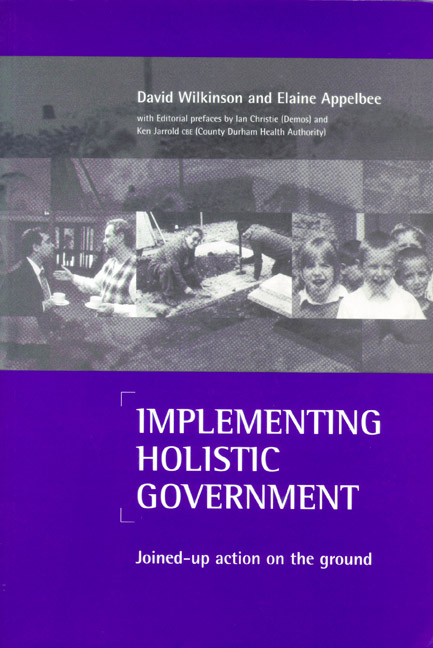Book contents
- Frontmatter
- Contents
- Editorial preface
- Editorial preface
- Acknowledgements
- Summary
- 1 Setting the context
- 2 The functional inheritance and its consequences
- 3 The public service, community interface
- 4 Change that works – sustaining community and quality of life improvement
- 5 Change that works – sustaining organisational and whole system change
- 6 Developing the middle ground: where bottom-up meets top-down (a third way for local governance?)
- 7 Improving sustainable quality of life: the benchmark for Best Value
- 8 Joined-up action on the ground: six key issues that have to be addressed
- 9 Working in the middle ground: recommendations to promote joined-up action on the ground
- References
Summary
Published online by Cambridge University Press: 05 July 2022
- Frontmatter
- Contents
- Editorial preface
- Editorial preface
- Acknowledgements
- Summary
- 1 Setting the context
- 2 The functional inheritance and its consequences
- 3 The public service, community interface
- 4 Change that works – sustaining community and quality of life improvement
- 5 Change that works – sustaining organisational and whole system change
- 6 Developing the middle ground: where bottom-up meets top-down (a third way for local governance?)
- 7 Improving sustainable quality of life: the benchmark for Best Value
- 8 Joined-up action on the ground: six key issues that have to be addressed
- 9 Working in the middle ground: recommendations to promote joined-up action on the ground
- References
Summary
The context (Chapter 1)
The new agenda for government in the twenty-first century is becoming clear. At its heart is the idea and the goal of ever more holistic government, built as much from the bottom up as from the top down. (6, 1997, p 70)
The shape of the Labour government's public and social policy intentions is now emerging. There is recognition that a series of intractable issues cannot be resolved in isolation. The causes of social exclusion, criminality, unemployment, poor health, low educational attainment, poor housing and welfare dependency are interlinked and multi-faceted. The Prime Minister has frequently talked of the need to keep the bigger picture in mind and called for “joined-up solutions for joined-up problems”. After a year in government he has reiterated the point yet again. Writing in The Observer, he said:
Even the basic policies, targeted at unemployment, poor skills, low incomes, poor housing, high crime, bad health and family breakdown, will not deliver their full effect unless they are properly linked together. Joined-up problems need joinedup solutions. (The Observer, 31 May 1998)
The logic and need are compelling. However, the history of previous attempts to coordinate policy, together with both the growth of scale and the establishment of very different managerial and professional cultures across the agencies of delivery, do not suggest this will be easy.
But the requirement for delivering the new agenda – for modernisation – becomes ever more pressing because of another set of factors. Electorates are becoming increasingly socially liberal and fiscally conservative. And the pressures for international global competitiveness place further limits upon government's capacity to raise spending.
In particular this means that public institutions and agencies will need to favour strategies of provision geared more towards prevention rather than simply upon cure. For example, improvements in population health and longevity have always resulted far more from improvements in public health and social conditions than from investment in acute medical and surgical interventions. Similarly, long-term investment in appropriate crime prevention can reduce the reliance on highly expensive long-term custodial care with its high levels of recidivism.
However, this provides national government in particular with a dilemma. The new agenda of public reforms place great stress on public consultation and involvement, but, for the most part, there is, for example, strong public support for acute healthcare and heavy custodial sentencing.
- Type
- Chapter
- Information
- Implementing Holistic GovernmentJoined-Up Action on the Ground, pp. 1 - 20Publisher: Bristol University PressPrint publication year: 1999



